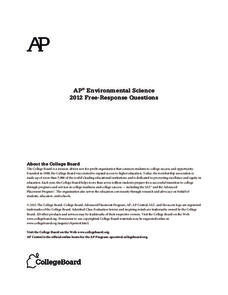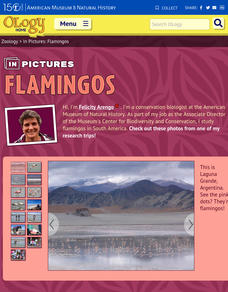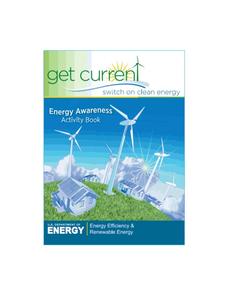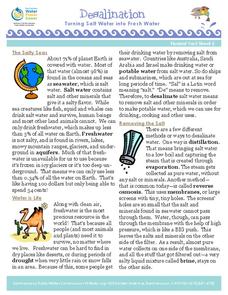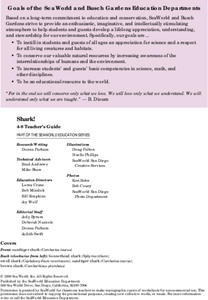K12 Reader
Summarize It: President Theodore Roosevelt's 7th Annual Message to Congress
How did Theodore Roosevelt stress the importance of conservation during his time as president of the United States? Take a closer look at the language Roosevelt used himself in a 1907 address to Congress, and have your young historians...
Teach Engineering
Bouncing Balls
How high will it bounce? Groups determine the height different balls bounce off of different surfaces. By performing the necessary calculations, they determine the initial and final momentum of the balls. The included worksheet provides...
Berkshire Museum
Where’s the Water?: Acting Out Science Cycles
Young scientists transform themselves into rivers, oceans, clouds, and drops of water in order to explore the water cycle. After assigning and explaining to learners their different roles in the activity, the teacher reads aloud a...
Texas State Energy Conservation Office
Cost-Effective Buying
Middle school energy experts read about the relationship between energy use and cost-efficiency. Then they work through a couple of scenarios to determine which approach is more cost-effective.
Polar Trec
What Is My Footprint?
How do one's habits and lifestyle choices affect the environment? Through a short online survey, learners will calculate their own carbon footprints then determine how to reduce their impact on the environment through simple steps, such...
PBS
Blow the Roof Off!
Blow the minds of young scientists with this collection of inquiry-based investigations. Based on a series of eight videos, these "hands-on, minds-on" science lessons engage young learners in exploring a wide range of topics from making...
Teach Engineering
Efficiency of an Electromechanical System
How efficient is a motor in a LEGO set? Future engineers conduct an activity where a LEGO motor-generator system raises an object to a specified height. They then show what they learned and use their measurements to calculate the energy...
Pingry School
Mole Relationship in a Chemical Reaction
What do budding scientists know about moles and reactions? Using an attention-grabbing lab experiment, young scholars collect data to apply the law of conservation of mass to predict the mass of gaseous products. They examine several...
Science Matters
Peanut Energy
How do humans get energy since they aren't mechanical and can't photosynthesize? Learners explore this question by relating potential energy in food to human energy levels. Scholars measure the change in mass and a change in temperature...
College Board
2004 AP® Environmental Science Free-Response Questions
Radioactive isotopes have a wealth of uses, but their waste may cause some concern. One of four free-response questions challenges learners to devise a waste removal strategy for medical radioactive substances. Other questions address...
College Board
2012 AP® Environmental Science Free-Response Questions
Sometimes solving one problem leads to another. Scholars respond to questions about fracking to harvest natural gas and other environmental related topics. The resource provides items released from the 2012 AP® Environmental Science exam...
Water
Global Water Supply Elementary School Curriculum
Water is the focus of an interdisciplinary unit that brings awareness to its daily use around the world and the importance of conservation. Worksheets challenge scholars to match words and definitions, trace, complete a maze, and solve a...
Purdue University
Designing a Device Utilizing a Balloon Filled with Carbon Dioxide
Don't waste all that carbon dioxide. Scholars first produce carbon dioxide by mixing baking soda and vinegar. They measure the masses of the reactants and products to verify the law of conservation of mass. As a culminating activity,...
Curated OER
FDR's Tree Army: Personal Turning Points in the CCC
What's the "deal" with the Civilian Conservation Corps? Primary sources help historians discover the impact of this landmark legislation. After an introductory slideshow and 7-minute video, groups analyze packets of images and a primary...
Mr. E. Science
Energy and Power
Teens often display potential energy in class and kinetic in the hallways. This third presentation covers the six types of energy, each in potential and kinetic form. It also covers the Law of Conservation of Energy and Einstein's Theory...
Baylor College
How Do We Use Water?
Send youngsters home to survey how they use water in their homes. Then bring them together to discuss which uses are essential for our health and which are not. A helpful video offers teaching tips for this lesson, and a presentation...
San Francisco Public Utilities Commission
What is Drought? No Rain, No Water
How can climate change affect our water supply? Have kids read a passage about the water cycle and water conservation, which includes six questions that challenge them to use context clues.
San Francisco Public Utilities Commission
What is Groundwater? Our Underground Water Supply
Learn about the consequences of groundwater with a lesson about the different ways California handles water conservation and pollution. After reading a passage about the water table, learners apply what they have read to six...
ARKive
An Introduction to Endangered Species
Explore the world's endangered species with a presentation and bingo game activity. After viewing a presentation about the meaning of endangered species as it relates to specific animals, kids play a game of bingo with cards that...
American Museum of Natural History
In Pictures: Flamingo
Fifteen photos take scholars on a journey to Laguna Grande, Argentina to observe how a group of scientists work with native flamingos. Stunning images showoff the flamingo, its environment, scientists in the wild, and the impact the...
American Forest Foundation
Who Speaks for the Trees?
Help young conservationists appreciate the important role that trees play in ecosystems around the world with this collection of six engaging activities. From a shared reading and class discussion of Dr. Seuss' The Lorax, to in an depth...
Curated OER
Energy Awareness Activity Book
If you are looking for worksheets about alternative energy sources to use on Earth Day, you'll find several here. However, since Earth Day is all about conserving natural resources, please print these double-sided in order to reduce the...
San Francisco Public Utilities Commission
Desalination: Turning Salt Water into Fresh Water
How does San Francisco supply its citizens with enough water, even during a drought? Learn about reservoirs and why desalination could be a good solution with a reading passage about water conservation. After kids finish the...
SeaWorld
Shark!
Here is an impressive collection of lessons on sharks. In them, pupils undertake a serious study of sharks, their habitats, their social structure, and how humans adversely impact their existence. These lessons effectively integrate...
Other popular searches
- Wildlife Conservation
- Water Conservation
- Marine Conservation
- Conservation Issues
- Conservation of Mass
- Conservation of Energy
- Conservation of Matter
- Energy Conservation
- Conservation of Momentum
- Law of Conservation of Energy
- Soil Conservation
- Law of Conservation of Mass












